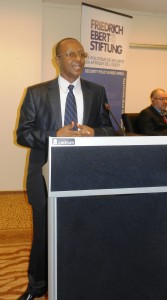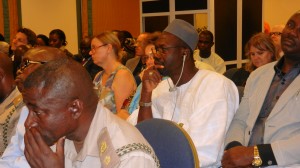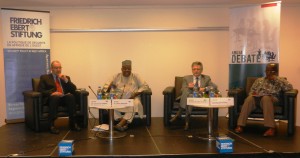The situation in Mali - Long-term challenges and regional responses
Since January of 2013, about 10,000 troops from numerous countries have been deployed to support the Malian army in fighting back the radical islamists. The situation is affecting not only the country itself, but the whole region. The first Abuja Debate of 2013 aimed at shedding some light on the long-term challenges preceding the current crisis and emanating from it. The event, which took place in Abuja on 27 February, attracted about 80 guests from various backgrounds.
A high-ranking panel promised insights into the undercurrents of the crisis. Speaking to the French role in Mali was the Ambassador of France to Nigeria, H.E. Mr. Jacques Champagne de Labriolle. The Speaker of the ECOWAS Parliament was ably represented by the Head of the Peace and Security Affairs committee, the Hon. Simon Osei-Mensah. Bringing in his organisations special expertise was Mr. Daniel de Torres from DCAF (Geneva Centre for the Democratic Control of the Armed Forces). The panel was moderated by the President of the West African Civil Society Forum (WACSOF), Dr. Jibrin Ibrahim. Mr. Mahamane Haidara, First Counsellor at the Embassy of the Republic of Mali to Nigeria, gave a key-note address.
Fighting the rebels – rebuilding the state
In the course of the debate, it became apparent that the Malian crisis consisted of various layers to be analysed. The three panellists agreed that the military intervention could only provide short-term solutions. The broader picture was to include a responsible and accountable government in full control of the Malian territory to be elected by the majority of all the Malian people. To end the marginalisation of large parts of the society, a new government’s policies were to be as inclusive as possible. This was the only way ahead to unify the Malian state. According to Mr. de Torres, this governance aspect should actually be the priority when rebuilding the state in order to ensure that corruption be extinguished and the people be able to regain trust in the country’s leadership. An important step would be the elections to be held in the near future. Although the panellists disagreed on when exactly Mali would be ready to hold national elections, they all stressed the importance of democratic procedure to enhance both the legitimacy and accountability of Mali’s government.
French soldiers to restore the peace
The French ambassador made clear that the French army only intervened because it was asked to do so. France intended to stay no longer than necessary. The military strength of the Islamist rebels came as a surprise to the Malian army. France therefore had to come in with heavy equipment. Questions by the audience about whether the French intervention was not short-sighted and could therefore not address the root causes of the conflict were actually seconded by the ambassador. France was not responsible and did not have a plan for the political development of the country. It should be up to the Malian people and ECOWAS to develop a road map for the restoration of the state after the intervention. What France and her partners tried to secure was a safe environment for that process.
ECOWAS – too little too late?
The role of ECOWAS was criticised by many guests, but defended by the representative of the ECOWAS Parliament and by the French Ambassador. Audience members demanded a more active role of the West-African Economic Community and ‘African solutions to African problems’. The ECOWAS mediators had proved to be ineffective and not capable of solving the challenges before the recent escalation. The ECOWAS Standby Force (ESF) had joined the fight against the rebels too late. While pointing out that he was not a part of the executive, the Hon. Simon Osei-Mensah actually begged to disagree. ECOWAS had been active in the Malian crisis from the very beginning on both the regional and global levels. As to the regional bloc’s military capabilities, he reminded that no standing rapid deployment forces existed and sending soldiers into harm’s way depended on the political will of the member states, of course. ECOWAS had further been lobbying the UN Security Council to authorise peace-enforcing
measures long before they had actually been green-lighted. H.E. Jacques Champagne de Labriolle underlined the improved cooperation between ECOWAS and France. In fact a large number of the ECOWAS contingents had been deployed by now. Also, he supported the combination of diplomatic and military approaches to solve the crisis. Still, a stronger, better trained, better equipped and most importantly faster-moving force would be appreciated, as Western countries, France specifically, could and should not act as the gendarmerie of Africa.
The long-term angle
The Mali intervention is likely to fuel to the hatred against governments and Western countries among Islamists all over the region. The existance of regional interdepencies go without saying. As one member of the audience added: The Islamists are being forced to flee Mali – but where are they fleeing to? The recent kidnappings of foreigners were not only to be viewed as political acts. In fact, they proved the strong interlinkages between criminal and terrorist structures. Dr. Jibrin Ibrahim emphasized the role, criminal structures played in the Malian conflict and how they linked Europe, Latin America, America and Africa through drug- and arms-trafficking. The same phenomenon could be observed in Guinea Bissau and other West-African countries. State institutions had proven too ineffective to react to the violence and national armies were not capable of protecting their countries. Therefore, the situation in Mali had to be regarded as a symptom of the general insecurity in the region – not as a cause.
The reasons for this insecurity were to be found in the political fragility of the states. The governments were not accountable, which increased the general mistrust in authority. Corruption scandals and the enrichment of political leaders deepened the gap between the elite and the population all over the region. The occurring frustration was shown in different manners. While some reacted with strikes or demonstrations, others turned their back on politics, while a small minority reacted in a violent manner trying to remove the elite they feel has disappointed them. Dr. Ibrahim in his closing statement prescribed more inclusion of marginalised groups, the fight against corruption and against the lack of opportunity for the young as the only possible way forward.
Friedrich-Ebert-Stiftung
Peace and Security Centre of Competence Sub-Saharan Africa
Point E, Rue de Fatick x Boulevard de l'Est,
Residence Bity Lokho, 6th floor
B.P. 15 416
Dakar - Fann





